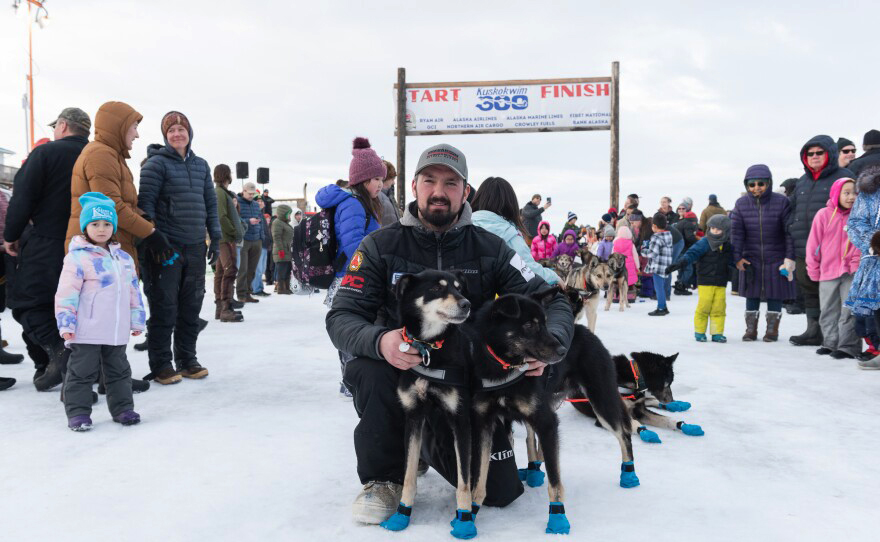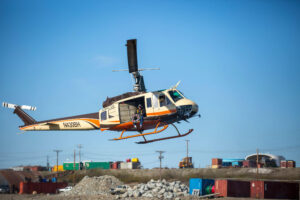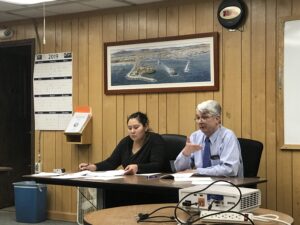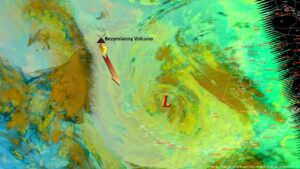This story by Ben Matheson was originally published by KYUK, and was republished with permission.
Bethel musher Pete Kaiser won his seventh Kuskokwim 300 title Sunday afternoon, outpacing a field of top mushers on the notoriously unpredictable Kuskokwim River trail.
Pete Kaiser arrived at the Bethel finish line at 12:26 p.m. on Sunday, Jan. 29 with his team of 11 dogs to meet a big crowd of friends and family ready to celebrate at the finish line.
“Always feel good to get here first, so I feel good,” said Kaiser.
A warm weekend with fresh snow made for a tough trail with slower than usual racing, especially on the run up to Aniak. Kaiser’s time of 41 hours and 56 minutes was the slowest winning time of the Kuskokwim 300 on the traditional race course in 15 years. Kaiser said that the first half of the race was as slow as he’s ever seen it since he began racing in 2009. Fresh snow and temperatures climbing into the 30s made for warm race conditions.
“I had the parka in the sled, but I never put it on once. It was a pretty warm race, actually enjoyable for mushers to not be freezing at 50 below,” said Kaiser. “A little warm for the dogs, but they did fine with it. ”
Kaiser was the first musher to leave the Tuluksak checkpoint early on Jan. 29 after resting his team for a mandatory four-hour break. But his race win was not locked up; he needed to outlast the surging 2019 winner, Matthew Failor, who was only eight minutes behind Kaiser going into the final 50-mile run of the race.
“I got a little comfortable out of Kalskag, kind of feeling like I was probably in more control than I actually was, so we were kind of just coasting along. I think we had a 25-minute lead, and then he snuck up on us all of a sudden and he was probably six or seven minutes behind us at one point. So we kind of just kept coasting and stayed in front of him, hoping to keep enough gas in the tank to have a good run in from Tuluksak,” said Kaiser.
Kaiser rotated four leaders throughout the race, including one two-year-old leader named Mookie. His team included four two-year-olds in addition to his race veterans.
Kaiser wins $25,000 for the victory and further chips away at the all-time win record. Only Jeff King has more K300 titles with his nine victories. Kaiser has now won seven of the past nine races. He won the 2015, 2016, 2017, 2018, 2020, and 2022 Kuskokwim 300 Sled Dog Races. Kaiser won the Iditarod Sled Dog Race in 2019.
Willow musher Matthew Failor came in second place 10 minutes after Kaiser. He said that his team had a strong second half as they cut into Kaiser’s lead as they ran downriver to Bethel.
“We saved a little bit in the tank on the way up that maybe helped us pass a few teams on the way down,” said Failor. “It’s hard to beat Pete; the only time we ever beat Pete was when we had a lead at Tuluksak. When you don’t have a lead on Pete at Tuluksak, it’s pretty difficult.”
Nenana musher Eddie Burke Jr. earned third place in his second Kuskokwim 300. He moved up nine spots from his 12th place finish last year. He said that snowy and wet conditions were a big change from the hard and fast trails he’s been training on in the Interior.
“We were kind of wallowing around out there, lots of water, but the dogs did well and they took right to it,” said Burke Jr.
Salcha musher Jacob Witkop finished in fourth place in his first K300, while 2021 champion Richie Diehl arrived in fifth place.
Twenty-one mushers started the race on Jan. 27 in Bethel. There was one scratch: Kwethluk musher Jason Pavila ended his race at the Tuluksak checkpoint after he fell on the ice outside of Kalskag and injured his shoulder.
Image at top: Pete Kaiser wins his seventh Kuskokwim 300 Sled Dog Race. Photo by Katie Basile, used with permission (2023).





